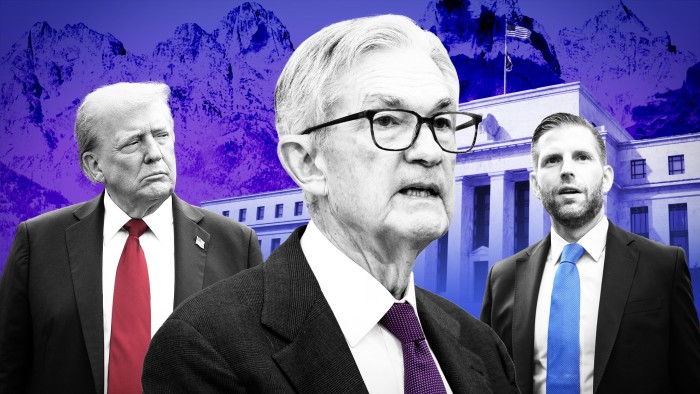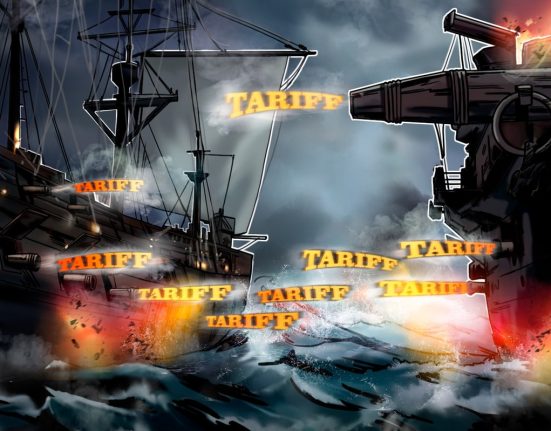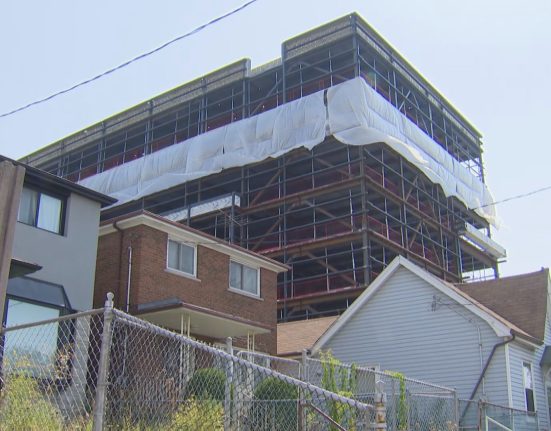As Jay Powell stood up to deliver what will almost certainly be his final address to the global economic-policymaking elite at Jackson Hole on Friday, a rival conference had just wrapped up in the same Grand Tetons mountain resort.
Headlined by Eric Trump, the speakers at the Wyoming Blockchain Symposium touted what they believed to be the new frontier of money. Their number included senior officials in the Trump administration, tech entrepreneurs and influential Republican Senator Tim Scott.
Held at the plush Four Seasons hotel, the blockchain event was a stark reminder of the political, intellectual and cultural clash that the US central bank is now facing.
In the view of President Donald Trump, the Federal Reserve chair and the group of global experts gathered down the road at the more rustic Jackson Lake Lodge are very much the old guard — and one he is intent on overthrowing.
While the Trump administration enthusiastically embraces disruptive digital assets and deregulation, it is at the same time undertaking an unprecedented assault on the foundations of America’s traditional policymaking order.
Under the banner of boosting growth, the president has been threatening to fire Powell and other top Fed officials in a bid to curb the central banking independence that has underpinned America’s economic foundations for over half a century.

This comes alongside a White House putsch at the Bureau of Labor Statistics that has shaken confidence in the sanctity of the economic data illuminating the world’s most powerful country.
For the past few decades, the meetings in Jackson Hole against the backdrop of Wyoming’s rugged mountains have come to embody the power and prestige of central bankers, with their debates on monetary policy transmission, quantitative easing and inflation dynamics.
But the economists listening to Powell at the Jackson Lake Lodge, which has been battling an influx of bats in recent weeks, are aware that the ascendancy of the technocrats is in danger of being thrown dramatically into reverse.
“When I speak to economists, they’re dispirited,” says Glenn Hubbard, a chair of the White House’s Council of Economic Advisers under George W Bush, citing the broad discontent among many Americans with experts. “They know economic policy lost a very important thread with the public.”
Hubbard, now a professor at Columbia University, adds: “My fear is that if they don’t pick up that thread, the populist frenzy is only going to get worse.”
In his speech on Friday morning, which was preceded by long applause, Powell pointedly stated that he and his colleagues would make their decisions “solely” on the basis of economic evidence, as he teed up the possibility of further interest rate cuts.
But he also acknowledged the impact of the period of inflation on Americans. “The past five years have been a painful reminder of the hardship that high inflation imposes, especially on those least able to meet the higher costs of necessities,” he said.
The stakes are clear. As delegates were making their way out west this week, it emerged that the Department of Justice had called on Powell to fire one of his fellow governors, Lisa Cook — a measure that the Fed chair has neither the power nor the inclination to enforce. On Friday, Trump also said Cook, who was in Jackson Hole, should be fired.
Cook said this week that she would not be “bullied” by the president “into stepping down” over allegations of mortgage fraud that have been made by Trump administration housing official and arch Fed critic Bill Pulte. The Fed and a spokesperson for Cook have declined to comment.
The attack on Cook came after Bureau of Labor Statistics commissioner Erika McEntarfer was fired this month following unfounded allegations by Trump that she “rigged” employment data in favour of opposition Democrats.
Powell — labelled a “numbskull” and a “moron” by Trump for refusing to cut interest rates — has made it clear he will serve out his term as Fed chair despite Trump’s repeated threats to defenestrate him.
But fears are rife in markets that Trump will ape what he has done at the BLS and name a political loyalist as the world’s most important central banker after Powell’s term ends in May 2026.
“There are too many fronts to fight back,” says Claudia Goldin, an economist at Harvard University. “You’re being attacked from all sides.”
The Jackson Hole conference has been held in its current location since the early 1980s, when the Kansas City Fed was trying to lure then chair Paul Volcker to its economic symposium.
Their bait was to host the event in a place that is renowned for its fly fishing — one of Volcker’s passions.
“There are few regions in the world with true world-class fishing for a half dozen different trout species,” says Chris Morrell, owner and operator of the local business High Alpine Anglers.
The debates at Jackson Hole not only shaped the global economic and financial landscape, but became a symbol of the status central bankers have come to hold over the past four decades.
By demonstrating that an independent central bank could bring inflation under control in the US following double-digit price growth, Volcker helped lay the foundations for governments around the world to give greater independence to economic technocrats.
The Maastricht treaty of 1992 created the framework for control over monetary policy to be handed to the European Central Bank at the end of the decade. In 1997, Tony Blair’s new Labour government finally gave the Bank of England, then a more than 300-year-old-institution, freedom to set interest rates without political meddling.
Inflation targeting, a system pioneered in New Zealand in the 1990s under which rate-setters pledged to do whatever it took to hit their price goals, grounded independence with an intellectual framework.
The diminished influence of fiscal policy left the monetary policymakers in charge of the most important tool in steering the macroeconomy — interest rates. Volcker’s successor Alan Greenspan even emerged, for a period, as an unlikely national icon.
“This is not to say everything is perfect,” says Karen Dynan, an economics professor at Harvard. “But even critics would have to acknowledge that the credibility that has anchored inflation expectations has just produced much better outcomes than might have otherwise been the case.”
Pressure on the Fed and its counterparts has, however, been brewing for years and did not start with the arrival of Trump in the White House.
Critics accused the Fed under Greenspan of failing to appreciate the dangerous imbalances that were building up in the US banking system and erupted in the financial crisis after his retirement.
Raghuram Rajan, then a University of Chicago academic, was one of those economists who warned about the potential risks in a 2005 paper — shortly before Greenspan retired from the Fed. Now back at Chicago after a stint running India’s central bank, he says the episode underscored the ongoing danger of central banking groupthink.

As Rajan puts it, there is a “certain kind of bureaucracy that sets in and says, ‘This is the way we think, let’s not accept that an alternative may be better.’”
More recently, the surging inflation after the pandemic was a scarring experience for millions of Americans and provided the Fed’s critics with ammunition for further attacks. The losses central banks are incurring as they attempt to pare back balance sheets that swelled during the years of quantitative easing are a further political target.
For all the progress the Fed has made in stamping out inflation over the past 18 months, an April Gallup poll showed public confidence in the Fed chair is now close to all-time lows.
That sentiment is evident in Wyoming. “I don’t think any of those folks coming to the conference really understand what normal, middle-class people are facing,” says Nate Bennett, owner of Teton Fly Fishing.
Some at the symposium privately criticised central bankers for a lack of contrition over their failure to prevent the bout of high inflation that sank many Americans into a cost of living crisis.
“There was a reckoning coming. It was deserved and needed,” says one attendee at Jackson Hole, adding that was not to say the Trump administration’s assault is justified.
Harvard’s Goldin believes the notion among some Americans that the establishment “makes stuff up” stems from a broader distrust for elites that can be traced back to the country’s revolutionary roots.
“We founded this country to be a non-elite county; we wanted the aristocracy of Europe out,” she says. “This isn’t the first time there has been anti-intellectualism in the US.”
For now, the president’s attacks are not proving to be the wrecking ball that many in the economic establishment predicted.
The stock market keeps on hitting fresh highs. Powell remains in post, and fears that he could be summarily dismissed by Trump have receded since earlier this year.
Nevertheless, economists warn the threats posed by Trump should be taken very seriously.
“The market has generally taken this in its stride,” says Neil Shearing, group chief economist at Capital Economics. “But these attacks on institutions are insidious . . . We don’t know how robust these institutions are and how these pressures will play out.”
Jackson Hole attendees warn that Trump’s calls on the Fed to cut interest rates aggressively to just 1 per cent — from the current level of 4.25-4.5 per cent — in a bid to save the US government hundreds of billions of dollars would probably have the opposite effect.

Damage central banks’ credibility, they say, and longer-term borrowing costs for governments, businesses and individuals will almost certainly rise.
The failure of governments to contain public debt levels despite low interest rates during the QE period has already made central bank policymaking difficult, says Mahmood Pradhan, global head of macroeconomics at Amundi Asset Management.
“If we have appointees who are primarily political loyalists, rather than people who have the right economic experience, this will be a material threat to evidence-based policymaking,” he says.
“And it may not achieve what Trump wants it to, because if you sacrifice central bank independence and rates are reduced to unwarranted levels, then investors will worry about inflation, long-dated interest rates will rise, and people will move away from dollar assets.”
Gary Richardson, a professor of economic history at the University of California at Irvine, says the threat to Fed independence is now the gravest since the Great Depression era when Franklin Delano Roosevelt was president.
But the structure of the modern Fed, including the regional Fed presidents, presents a potential check on the White House. “The institution is designed to resist this kind of pressure and it certainly could,” he says.
Some economists remain optimistic that independent US policymaking dominated by experts will survive the storm. “The US will go through this and eventually it will come out on the other side and recognise that it does need a central bank to keep the value of money reasonably stable,” says Rajan.
The alternative, says Maury Obstfeld of the Peterson Institute for International Economics, would be deeply worrying.
“These attempts to discredit expertise are ultimately going to end up showing themselves in the markets,” he says. “Even though expertise doesn’t always get it right, it’s much better than going with what’s politically convenient at the time.”
Additional reporting by Ian Hodgson in Washington







